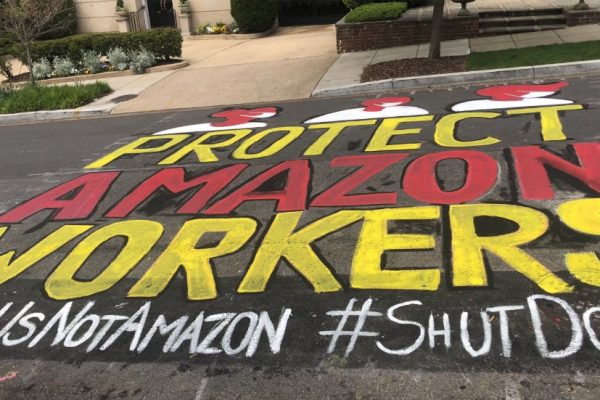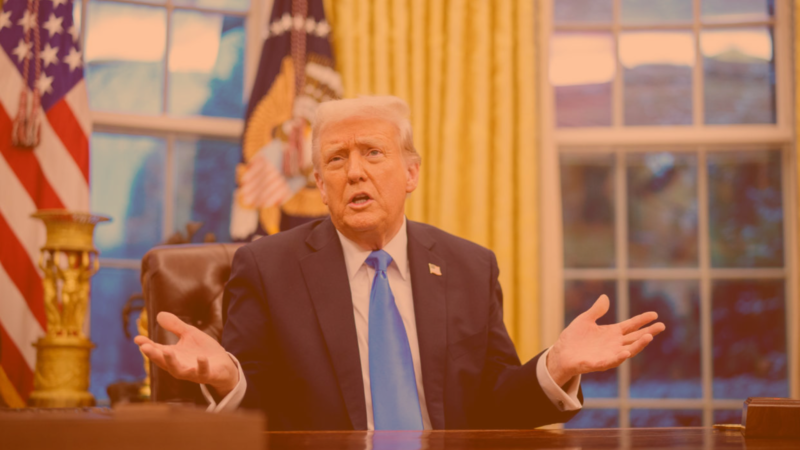Amazon workers’ righteous indignation against the silicon valley model is galvanising workers to organise at this critical moment in global history.
“What we’ve got right now is bigger than all of us. It’s about saving humanity. It’s life or death. But we also want to keep our jobs. None of us should be retaliated against (…)”
— Chris Smalls
As the deadly effects of the coronavirus in Europe slow, the true extent of an austerity ravaged medical system is revealed. A great unveiling is happening in the economy as finance and work decouple. The Nasdaq’s flagship technocratic surveillance businesses that “treat the humans in the warehouses as fungible units,” capitalise on precarity. But the coronavirus has now revealed the power behind the mass of vulnerable yet ‘essential’ workers, and the shadow of tens of millions of newly unemployed.
Colourful titles and vacuous clapping cannot massage the monthly staple of low pay, no worker rights and zero hours contracts.
Amazon workers subject to the risks that the pandemic brings to their warehouses — such as DiEM25 TV’s recent guest Chris Smalls — are stepping forward to challenge the behemoth that Amazon represents. Their righteous indignation against the silicon valley model has not only captured the media but is galvanising millions to organise at this critical moment in global history. This current jostling between modern titans of capitalism and low wage workers reminds us of a simple yet historical truth: that “our secret superpower is our ability to cooperate.”
As an editorial in the Financial Times suggested on April 3, the lockdown will “shine a glaring light on existing inequalities — and even create new ones.” We are staggering our way into a new normal with doctors demanding adequate PPE, meatpackers ordered to work in infected zones while unemployment skyrockets past Great Depression levels. As this historical moment threatens to shatter the current social contract, world leaders in the West offer distracting ramblings about China, allegations of the World Health Organisation’s politicisation and incoherent government reopening guidelines.
Tasked with the heaviest load to carry, essential workers are subject to a rebranding exercise devoid of substance but full of pomp and spectacle.
The PR infused messages of togetherness have done little to placate the stark dilemma facing many essential workers around the world. Workers are asked to accept without question additional responsibilities whilst being given minimal medical precautions, and to face the virus in their workplace and the uncertainties that this propagates in their personal and family lives. This exposure subjects their friends, colleagues and family to the coronavirus while increasing the stress of their work. Should they conscientiously object, they run the high risk of losing their job, medical benefits — and in some cases becoming homeless — due to low worker protections.
Italian doctors released a statement in March, which NHS workers have echoed, stating that “we have been getting ready, with ‘scientific rigour’, to make sure we wouldn’t have enough resources to deal with a health emergency like the present one.” Medical staff clearly form the backbone of the new ‘essential work’ economy and have been on the front line of the PPE debacle.
Image Source
This comes when global markets are propelled higher with liquidity injections of epic proportions to large corporations while essential workers are press ganged into infected workplaces to keep the economy stuttering along. The message couldn’t be clearer. As Chris Smalls said in his recent DiEM25 interview “this pandemic exposed a lot about how we are as humans.” Perhaps as the glaring exploitation becomes too unsustainable, there will be a modern watershed moment mirroring what followed the Triangle Shirtwaist factory fire of 1911.
Former Amazon warehouse manager Chris Smalls made headlines around the world after getting fired following his outspoken criticism concerning the lack of Amazon’s COVID-19 measures.
A targeted campaign by Amazon describing him as “not smart or articulate,” and attempting to isolate him as the “face of the entire union/organising movement.” Furthermore, the leaked documents shown by Vice claim that the issues were raised in a meeting involving CEO Jeff Bezos.
During the interview, he raised awareness about the many employees who resorted to sleeping in cars because they couldn’t pay rent, were putting their families at risk of infection or working while ill. He states that “It ‘absolutely’ makes sense to boycott Amazon.” He expanded by saying that the lack of health and safety measures do not only impact certain employees, but could also impact their customers and other people that handle Amazon packages:
“There are several people put at risk. To get these items to your doorstep it has to go through inbound, outbound, receiving, ship docks, a sort centre — it touches 6,7,8 people including the customer. It lives on cardboard for a number of days, and could be on your item depending if someone touched it: drivers could be positive, asymptomatic or didn’t get a test; you would never know. My advice is: until the company protects the employees, as a consumer, don’t support them.”
He sounds indignant and principled; returning to his care for employees as someone that has been a supervisor at Amazon for many years. Despite the growing international attention he clearly states “I’m not afraid of nothing.” He reaches out to other workers internationally and says: “I’m here for you guys, if you’re afraid to speak, don’t be afraid, I fully support you and I’ll do everything I can to help you guys out.”
They have mobilised with many other gig and essential workers, including from other companies, to form a significant movement planning unprecedented strikes.
An opportunity to ‘take power back’.
Already with a few weeks momentum and many interviews behind him, Chris senses that right now they have ‘an opportunity to take power back’. He notes that “there has been an imbalance of power, possibly all across the world.”
So far, they have created a network of people who assemble a ‘heat map‘ of current outbreaks at Amazon warehouses across the USA. They have currently found more than 600 cases with at least seven known deaths and no answers about overcrowding and infections.
Chris Smalls’ demands are as follows:
- That former employees who were fired for valuing their health be reinstated and retropaid.
- Personal Protective Equipment (PPE) be provided to workers — “no excuses for that.”
- Transparency regarding cases in the buildings, while respecting privacy.
- Take care of your employees with a tiny amount of Amazon’s profits!
Following these actions, the resignation of Vice President Tim Bray amplified international headlines around the issue.
The Vice President and ‘Distinguished Engineer’ at Amazon Web Services announced that there was a ‘vein of toxicity’ running through the company culture, continuing by claiming: “I choose neither to serve nor drink that poison.“ This statement comes in light of the catalogue of retaliatory of firings and internal protests from Amazon tech workers condemning the firings.
Tim Bray retrospectively states that “Amazon’s messaging has been urgent… prioritising this issue and putting massive efforts into warehouse safety.” He adds however that:
“at the end of the day, the big problem isn’t the specifics of COVID-19 response. It’s that Amazon treats the humans in the warehouses as fungible units of pick-and-pack potential. Only that’s not just Amazon, it’s how 21st Century Capitalism is done.”
Bray highlights how:
“it’s all about power balances. The warehouse workers are weak and getting weaker, what with mass unemployment and (in the US) job-linked health insurance. So they’re gonna get treated like crap, because capitalism. Any plausible solution has to start with increasing their collective strength.”
This refreshingly curt take highlights how timely Chris Smalls’ crucial collective action is.
As Smalls says,“start[ing] a revolution… [that] changed the entire Amazon network.”
Stephen Brier, a labour historian at CUNY, states that “these workers were so shamelessly exploited for so long while performing incredibly important but largely invisible labour.” He stresses the importance of this moment for Amazon workers: “all of a sudden, they’re essential workers in a pandemic, giving them tremendous leverage and power if they organise collectively.“ Indeed, essential workers now maintain the edifice of the failed corporate-state economy. They organise and coordinate through encrypted messaging services like Telegram and Signal with workers rights groups like Amazonians United, Target Workers Unite, Whole Worker and the Gig Workers Collective.
Looking Internationally to the UK, Allyson Pollock clarifies how essential workers are used to curb the risks of others. She states: “we are put into lockdown because we have been made individually responsible for making sure other people are not infected, but the government did not play its own part, which is to take responsibility and have foreseen the disaster[s].” Here Pollock illustrates how the individual has been made to bear the burden of the cardinal ineptitude and short-sightedness of governments in the West.
Encouragingly, Chris Smalls’ fate has been picked up by a lot of the media. Recently, nine democratic senators sent a letter to Amazon inquiring “about Amazon’s policies regarding ground for employee discipline and termination.” This follows New York Mayor Bill de Blasio ordering the city’s commission on human rights to look into the matter, and the New York Attorney General calling the firing of Mr. Smalls and at least another four employees “disgraceful.”
As increasing reports show the growing infection numbers of essential workers around the world, they are being thrown into the front line and remain underprotected, underpaid, and under surveillance.
What makes this insidious is that even before scientists give their permission to re-open the economy, politicians are downplaying the risk of work and prioritising the market over human life, just as before the pandemic.
As the essential workers needed to maintain the veneer of normalcy die from the coronavirus, Chris Smalls reiterates in the interview how this is the time act: “its life or death.” He notes how in France, they ‘took their power back’. If anything the current conditions highlight the extreme case for a Universal Basic Dividend. Support for the Universal Basic Dividend (UBD) stretches even to the Financial Times, because coronavirus has made clear that we need this more urgently than ever.
The coronavirus has given internet companies a surge of traffic and stock prices. Instacart hired 300,000 workers in March alone — more than it’s current work force — and in May announced it would hire 250,000 more to meet this historic demand. Amazon, on the other hand, hired 175,000 from March to May primarily to make up for its large workforce taking unpaid leave out of fear of being infected.
According to The Guardian, Jeff Bezos made $11,000-a-second during the coronavirus bonanza. Mike Pence, the Vice President and head of the coronavirus Task Force was quick to thank Amazon for “meet[ing] the needs of the American people as we face this pandemic together.” This pandering to large conglomerates reveals the cosy links between business and government that this virus has solidified. This hides what many business leaders see clearly; namely that a significant reorganisation of the system is needed.
Image Source
We cannot wait for the morality penny to drop externally.
This pandemic has shown that governments don’t have the creativity to navigate extreme moments such of crisis. Corporate businesses also subjected to the logics of the shareholder have a colossal limitation to their ‘rational’ actions. This is beyond the figurehead of billionaire tycoons. Amazon is divided up into multiple business entities with masses of shareholders, many of which are key Western companies.
This illustrates a crisis of the imagination. In Sapians, Yuval Noah Harari states that it’s our shared fictions that propelled us to inhabit the world. This notion of shared fiction entails reconfiguring our realities and where better to begin than in finance. Indeed this can begin with finally unwinding the myths of neoliberal capitalism, beginning from the Left. Perhaps the Left did buy into the myth spread from Right economists during the 1970s that globalised finance had circumvented the state’s ability to control labour markets and remain subservient to financial markets.
However, the drum beat of the Universal Basic Dividend grows louder with every passing month. Similarly, financial circles are being acquainted with the ideas of Modern Monetary Theory. We need these to kickstart a reimagining process which includes property rights, limited liability corporations, the nation state, the notion of work and of course money itself. If we collectively decide to alter the myths, we can relatively quickly and dramatically alter behaviour.
Chis Smalls finds himself “catapulted into this position.” He wasn’t a prior activist — but he states that he is being empowered by the ‘love and support’ he is receiving. “That’s all I need,” he says. Similarly, Rutger Bregman’s new book,
‘A Hopeful History’ underlines how “our secret superpower is our ability to cooperate.” In it, he examines how rather than mirroring the dynamic in the popular Lord of the Flies, a real example of island-stranded boys in the Pacific proved that humans tend toward cooperation and mutual aid.
Yuval Noah Harari recently stated that “what we are seeing around the world now is not an inevitable natural disaster. It is a human failure. The coronavirus outbreak was no ‘black swan‘ as a catalogue of viruses history have warned. Nassem Taleeb suggests there will be ‘a move to localism.’ He underlines the need to react to events, seek the knowledgeable on the ground not in the institutions. Perhaps the catalogue of ‘essential workers’ form part of Taleeb’s ‘real experts’, on the ground with quality information and able to lift the curtain of lies and PR from both governments and corporates.
An unexpected leader, Chris Small rouses that “it’s time to organise, contribute and get active in your circles.”
He calls on ‘essential workers’, ‘customers’, and all other members of society to contribute to this growing movement that calls for a return of humanity at the center of work. He reminds those that are unsure about their capacity to organise that all he had to do was connect to his employees and other workers. He also calls out to others: “You’re still a part of the fight just by speaking up, if you’re a supportive consumer or an employee, you’re supporting the cause.”
Ken Loach’s film ‘Sorry We Missed You’ shows the destructive power woven into the myth of the ‘self-employed’ worker. A UK MP described the gig economy as a “form of such exploitation that it would be difficult for the supreme court to differentiate between this and other forms of modern slavery.” Indeed, the question of who gets to wear a mask, reveals our common implication in the transnational political economy of protective equipment, which is currently working to distribute the harms of this crisis according to the prerogatives of class power and the profit motive.
Although Amazon has now made steps based on the national media coverage Chris Smalls emphasises all of the workers’ demands haven’t yet been met.
As he continues the fight for the basic set of demands in May he adds: “I’m only afraid of God, I have always been a natural born leader, my entire life, it’s funny they should be afraid of me…”
The demand for ‘personal protection’, done in a collective manner, circumvents the oppression from Amazon management and claims an equality over the value of their life. In other words, the symbolism of the mask points towards a demand to have their lives valued. Warehouse workers protesting with their bandanas, torn shirts and sliced pillowcases have found the courage to not be crushed by their circumstances and use this to energise the fight to hold their bosses accountable.
As Richard Woodall states Here, “the mask acquires a fresh double significance: a necessary condition of survival and the common basis on which vital structures of communal solidarity might be reaffirmed.”
Watch our interview with Amazon whistleblower Chris Smalls on DiEM25 TV.
Do you want to be informed of DiEM25's actions? Sign up here















